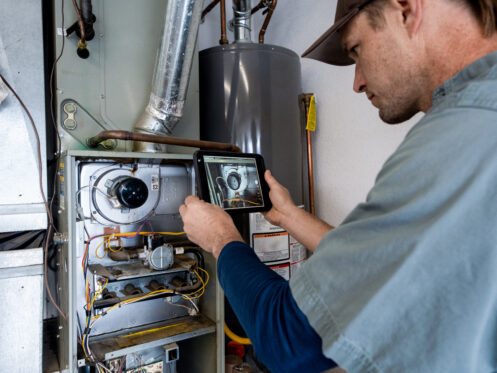Furnace technology has advanced a lot over the years, and today’s furnaces are much quieter than they were in the past. Nonetheless, modern furnaces still produce a decent amount of noise that you’ll be able to hear throughout much of your home. When your heating system first turns on, you’ll usually hear the furnace’s draft inducer fan start running. You’ll then hear the burners ignite and continue hearing the gas burning throughout the heating cycle. After the burners are lit, you’ll then hear the blower come on and start pulling cool air into the furnace and circulating heat around your home.
However, your furnace shouldn’t ever make excessive noise or start producing unusual sounds like rattling, booming, whistling, squealing or banging. If you hear any of these sounds, it’s a good indication that your furnace and heating system aren’t working properly and you should have everything inspected. With that in mind, let’s look at some of the most common issues that can cause your furnace to be loud or make strange sounds.
Dirty Air Filter
A dirty, clogged air filter will make your heating system much less effective and can cause many different issues with your furnace. As such, it’s important that you remember to change the air filter on your furnace regularly. Ideally, you should always check the condition of the filter monthly and never go for more than two or three months without replacing or cleaning it.
When your furnace runs loudly or makes a whistling noise, it most commonly means that the air filter is clogged. A clogged filter will also cause the blower to run more loudly. All of the dust and debris that gets trapped in the filter will start to slowly obstruct the airflow. If the airflow is severely restricted because of a dirty filter, it puts lots of extra strain on the blower. This means it has to work harder to pull air in, which causes it to run very loudly.
Restricted airflow can also cause a furnace to make an audible whistling sound. This is because the blower will end up drawing air in through other places, such as gaps in your ductwork. As air is drawn through the gaps, it can produce a loud whistling sound.
Loose or Leaky Ductwork
If your ductwork has lots of gaps or cracks, air can get sucked in through the openings and make a whistling sound even if the filter isn’t dirty. Air ducts can also start to come loose or sag over time, and this can cause the ducts to vibrate and produce a loud rattling or banging sound. In either case, the solution is to have your ductwork repaired or resealed. If your ducts are more than 20-25 years old and not in great condition, the better option is to have the entire duct system replaced. While replacing your ductwork is a fairly expensive project, it will help your heating system to work much more effectively and can save you quite a bit on heating costs.
Ignition Delay Caused by Dirty or Clogged Furnace Burners
One of the most important parts of an annual furnace maintenance and tune-up service is for the technician to fully clean the gas ports on the unit’s burners. When a furnace sits idle during the warmer months, the ports can collect lots of dust and cobwebs. If the burners are dirty, there will often be a small delay from when gas starts flowing until the burners ignite.
Think about what happens with a gas barbecue grill if you turn the burners and they don’t immediately light. Gas starts to fill the grill and produces a small fireball once it ignites. This is exactly what happens if the burners on your furnace don’t light immediately. Gas starts to flow out into the combustion chamber and results in a fireball when it ignites, and this is what causes a furnace to make a loud rumbling or booming noise whenever starts up. If you hear this sound, it is a sure sign that you need to have a technician clean your furnace burners.
If the burners on your furnace are too dirty, the unit will also produce far less heat and lead to higher heating costs. This is because dirty burners prevent the gas from completely combusting. When gas doesn’t fully combust, the flames it produces aren’t nearly as hot and will be yellow or orange colored instead of bright blue.
Malfunctioning or Damaged Blower
Issues with the blower can also make your furnace run loudly or produce a squealing, screeching or squeaking noise. If your blower starts to wear out, you will typically hear it running much louder as it struggles to move air through your heating system. Most modern blowers have a direct-drive motor with bearings. The bearings will produce a loud squealing or squeaking sound if they start to wear out, and this is a sure sign that you need to have the bearings replaced. If you have an older furnace, it may have a belt-driven motor. Just like the fan belt in your car, the belt that drives the blower motor will produce a squealing sound if it is worn out or misaligned.
Although it happens more rarely, the blower can also start to come loose. This can lead to it rattling or cause the blower wheel to scrape against the housing and produce a screeching sound like metal grinding on metal.
Worn-Out Capacitor
Most blowers have a start capacitor and a run capacitor, and these capacitors are similar to a large battery that provides an extra surge of electricity to help the blower motor start and keep it running. If the start capacitor burns out, the blower typically won’t start and will often make a loud humming sound when it tries to turn on. Another sure sign of a worn-out start capacitor is if you hear a repeated clicking sound and the blower doesn’t come on.
The blower will usually be able to continue running if the run capacitor is bad. However, this will cause the motor to draw much more electricity and can make it start humming. A bad run capacitor can also lead to your heating system frequently tripping the circuit breaker.
Cracked Heat Exchanger
A cracked heat exchanger is by far the worst issue a furnace can have, as it will allow some carbon monoxide to escape and leak out into the supply ductwork. As the furnace runs, the carbon monoxide will then get blown out of all of the vents in your home and create a serious risk of deadly carbon monoxide poisoning. If any of the metal heat exchanger tubes are seriously cracked or come completely loose, you’ll usually hear a loud rattling sound. While rattling sounds can occur for other reasons, we would always recommend shutting your furnace off immediately if it does rattle. You’ll then need to have a technician inspect the heat exchanger to see if it’s cracked.
Unfortunately, a cracked heat exchanger generally means you’ll need to replace your furnace. Replacing a heat exchanger is extremely expensive and will likely end up costing you about the same as what you’ll pay for a replacement furnace. As such, it only ever makes sense if the heat exchanger is still under warranty. The technician would also need to prove that the crack was due to a defect in the manufacturing process. Furnace warranties only cover manufacturing defects and not issues that arise due to neglect or general wear and tear.
The expert technicians at Aurora Pro Services Heating, Air, Plumbing, Electrical, & Roofing are ready to help if your furnace is making loud noises or has any other issues. We offer professional furnace maintenance, repair and installation services, and we can also take care of your cooling, plumbing, electrical and roofing needs. Give us a call today if you need a furnace inspection or any home service in Greensboro or the Triad area.






